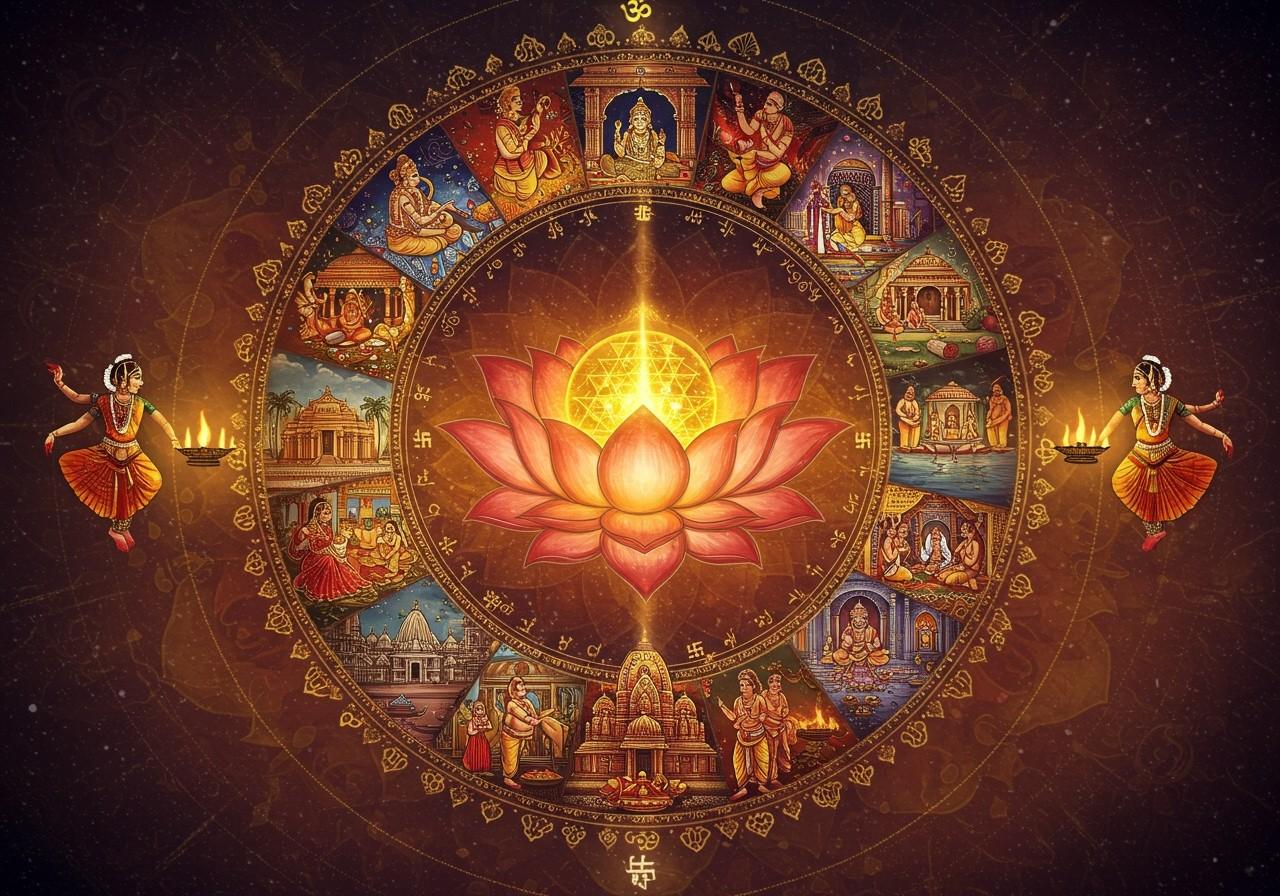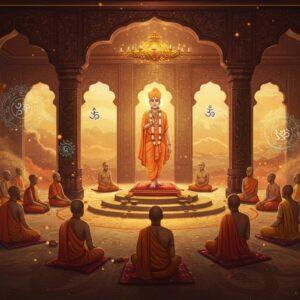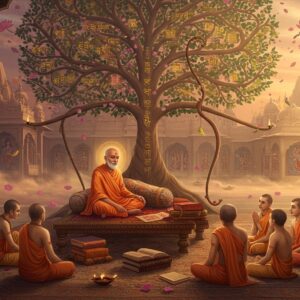
Hindu culture is a vibrant mosaic of traditions, philosophies, and practices that have developed over millennia. It’s more than just a religion; it’s a way of life, deeply interwoven with the fabric of Indian society. This culture influences daily routines, customs, and traditions, shaping individual identities and community bonds.
Understanding Hindu Beliefs and Practices
Central to Hinduism are concepts like Dharma (duty), Karma (action and consequence), and Moksha (liberation). These ideas are not merely historical artifacts but living principles that guide personal and familial experiences for many. Balancing tradition with the demands of modern life is a recurring theme for those practicing Hinduism today.
Hindu Mythology and Folklore
Hindu mythology presents a captivating array of stories that convey moral and ethical lessons. Epics like the Mahabharata and Ramayana are more than just narratives; they serve as guides for righteous living. These stories provide profound insights into human nature, duty, and the complexities of relationships.
Deities such as Vishnu, Shiva, and Devi embody various virtues and values, playing crucial roles in shaping cultural beliefs. Vishnu, the preserver, maintains the cosmic order, while Shiva, the destroyer, represents transformation and renewal. Devi, the mother goddess, symbolizes power, nurturing, and protection. These deities are not simply worshipped; they are integrated into everyday life, inspiring devotion and guiding moral conduct.
Across India, diverse regional folklore contributes to the rich cultural mix. In Bengal, Durga’s triumph over Mahishasura is celebrated with grand Durga Puja festivities. South India reveres Lord Murugan, whose legends are deeply embedded in local traditions. These regional variations enrich the broader tapestry of Hindu culture, showcasing its adaptability and enduring appeal.
Festivals like Diwali and Holi are rooted in mythological stories, bringing communities together. Diwali, the festival of lights, signifies the victory of light over darkness, while Holi, the festival of colors, celebrates the arrival of spring and the playful spirit of Krishna. These vibrant celebrations strengthen social bonds and reinforce cultural identity.
Hindu mythology significantly influences Indian art forms, including dance, music, and theater. Classical dance forms like Bharatanatyam and Kathak often depict stories from the epics. Music compositions recount the deeds of deities, adding a melodious dimension to these narratives. Theatrical performances, such as Ramlila, bring the Ramayana to life during festival times. These art forms provide powerful mediums for transmitting cultural values and preserving ancient traditions.
For those seeking deeper understanding and authentic products for their spiritual journey, consider exploring Poojn.in. Connecting With Your Inner Self: A Hindu Philosophy Guide offers further insights into Hindu philosophy. You can also find a wide variety of spiritual and religious items on Poojn.in, from incense sticks to deity idols.
Key Aspects of Hindu Culture and Traditions
- Origins and Diversity: Hinduism doesn’t have a single founder but emerged from a fusion of various beliefs and traditions, primarily originating in the Indus Valley. It encompasses a wide spectrum of Indian religious and spiritual traditions, making it a diverse and evolving faith.
- Sanātana Dharma: Often referred to as Sanātana Dharma, meaning “the eternal law” or “eternal way,” this term highlights the timeless and universal nature of Hindu principles. This concept emphasizes the enduring relevance of Hindu teachings across generations and cultures.
- Deities: Hinduism acknowledges one supreme being, Brahman, while also embracing the worship of multiple gods and goddesses, each representing different aspects of the divine. This henotheistic approach allows for diverse forms of worship and spiritual expression.
- Beliefs: Core Hindu concepts include Karma (the law of cause and effect), Samsara (the cycle of rebirth), and Moksha (liberation from this cycle). These interconnected concepts form the foundation of Hindu philosophy and guide individual actions and spiritual aspirations.
- Puruṣārthas: The four aims of human life—Dharma (duty), Artha (prosperity), Kama (desire), and Moksha (liberation)—provide a framework for a fulfilling and meaningful existence. These Purusharthas encourage a balanced pursuit of material and spiritual well-being.
- Practices: Hindu practices encompass a wide range of activities, including devotion (bhakti), worship (puja), rituals (yajna), meditation (dhyana), and yoga. These practices facilitate spiritual growth, self-discovery, and connection with the divine. Discover more about incorporating mindfulness into your rituals through Mindful Rituals: Enhance Your Spiritual Life.
- Sacred Texts: The Vedas, Upanishads, Puranas, Mahabharata (including the Bhagavad Gita), Ramayana, and Agamas constitute the major Hindu scriptures. These texts offer profound wisdom, guidance, and narratives that have shaped Hindu thought and practice for centuries.
- Social Structure: Traditionally, Hindu society was organized around a caste system. While this system has evolved and faced significant reform, it remains a complex and influential aspect of Hindu social dynamics.
- Family: Family plays a central role in Hindu culture, with the extended family often living together and providing mutual support. Elders hold a position of respect and offer guidance, while family bonds are highly valued and nurtured across generations.
- Marriage: Marriage is considered a sacred union, bonding two souls for multiple lifetimes. It’s not just a social contract but a spiritual commitment, emphasizing the importance of family and continuity of lineage.
- Symbols: Symbols like the swastika hold deep meaning in Hinduism, representing auspiciousness, good fortune, and prosperity. These symbols are often incorporated into rituals, art, and daily life, serving as reminders of spiritual principles and cultural values.
Poojn.in: Your Gateway to Hindu Cultural Goods
Poojn.in offers a wide selection of products to support your exploration and practice of Hindu traditions. Whether you’re searching for puja items, deity idols, or sacred texts, Poojn.in provides a convenient and reliable platform. Learn how to create your own modern home mandir with Create Your Modern Home Mandir: A Step-by-Step Guide. You can find everything you need to enhance your spiritual practices and connect with your heritage. Looking for sattvic recipes? Check out Festive Feasts: Sattvic Recipes for Delicious Celebrations.
Conclusion
Hinduism is a rich and complex tradition, embracing a wide range of philosophical perspectives, spiritual practices, and cultural expressions. From ancient scriptures to vibrant festivals, Hinduism continues to shape the lives of millions, offering a path towards self-discovery, spiritual growth, and a deeper understanding of the universe. For those seeking to deepen their knowledge and engage with Hindu culture, Poojn.in provides valuable resources and authentic products to support their journey.


